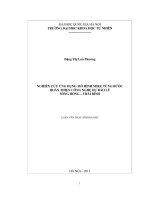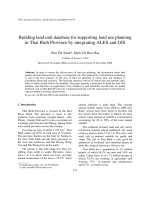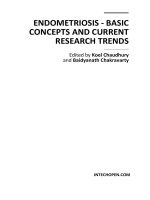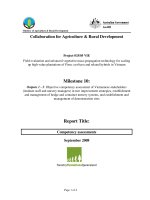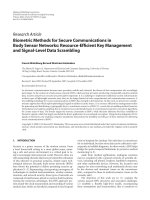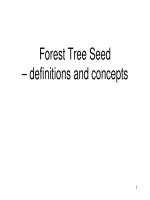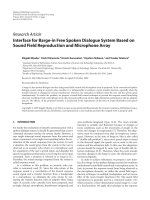Research methods for law (Phương pháp nghiên cứu luật học)
Bạn đang xem bản rút gọn của tài liệu. Xem và tải ngay bản đầy đủ của tài liệu tại đây (985.99 KB, 257 trang )
RESEARCH METHODS FOR THE ARTS AND HUMANITIES
GENERAL EDITOR: GABRIELE GRIFFIN
Research Methods for Law
Edited by Mike McConville and Wing Hong Chui
Research Methods for Law introduces undergraduate and postgraduate students to
available methods of research – legalistic, empirical, comparative and theoretical –
drawing on actual research projects as examples.The book is written by a team of
contributors with a broad range of teaching and research experience in law, criminal
justice and socio-legal studies.
Professor Mike McConville is Simon F. S. Li Professor of Law and Director, School of
Law in The Chinese University of Hong Kong.
Dr Wing Hong Chui is Associate Professor in the School of Law at The Chinese
University of Hong Kong.
Edited by Mike McConville
and Wing Hong Chui
Designed to serve as a handbook for research methods courses with its coverage
of the principal research traditions, the book will also appeal to students of related
disciplines who have an interest in legal issues including those from criminology,
sociology, psychology, government, politics and social administration.The rich mix of
general lessons, theoretical engagement and practical examples will be of real value
to students.
Research Methods for Law
Designed to serve postgraduate students and academics teaching research
methods, this series provides discipline-specific volumes which explore the
possibilities and limitations of a range of research methods applicable to the
subject in question.
Cover design: River Design, Edinburgh
www.eup.ed.ac.uk
ISBN 978 0 7486 3358 6
barcode
Edinburgh
Edinburgh University Press
22 George Square, Edinburgh EH8 9LF
Research Methods
for Law
Edited by Mike McConville
and Wing Hong Chui
Research Methods for Law
RESEARCH METHODS FOR THE ARTS AND HUMANITIES
Published Titles
Research Methods for English Studies
Edited by Gabrielle Griffin
Forthcoming Titles in the Series
Textual Editing in English Studies
Research Methods for History
Research Methods for Practice-based Research
Research Methods for Film Studios
Research Methods for Linguistics
Research Methods in Theatre Studies
Research Methods for Geography
Research Methods in Cultural Studies
Research Methods for Education
Advisory Board
Professor Geoffrey Crossick, Chief Executive, AHRB
Professor Warwick Gould, Director, Institute of English Studies, London
Professor David Bradby, Theatre Studies, Royal Holloway, London
Professor Angela McRobbie, Media and Communication Studies,
Goldsmith’s, London
Professor Robert Morris, History, Edinburgh University
Professor Harold Short, Director of the Centre for Computing in the
Humanities (CCH) at King’s College London
Research Methods for Law
Edited by Mike McConville and Wing Hong Chui
Edinburgh University Press
© in this edition, Edinburgh University Press,
© in the individual contributions is retained by the authors
Edinburgh University Press Ltd
George Square, Edinburgh
Typeset in / Ehrhardt by
Servis Filmsetting Ltd, Manchester, and
printed and bound in Great Britain by
Antony Rowe Ltd, Chippenham, Wilts
A CIP record for this book is available from the British Library
(hardback)
(paperback)
The right of the contributors
to be identified as authors of this work
has been asserted in accordance with
the Copyright, Designs and Patents Act .
Contents
Preface and Acknowledgements
Introduction and Overview
Mike McConville and Wing Hong Chui
vii
1. Qualitative Legal Research
Ian Dobinson and Francis Johns
2. Quantitative Legal Research
Wing Hong Chui
3. Doing Ethnographic Research: Lessons from a Case Study
Satnam Choongh
4. Comparative Legal Scholarship
Geoffrey Wilson
5. Integrating Theory and Method in the Comparative
Contextual Analysis of Trial Process
Mark Findlay and Ralph Henham
6. Researching the Landless Movement in Brazil
George Meszaros
7. Non-empirical Discovery in Legal Scholarship – Choosing,
Researching and Writing a Traditional Scholarly Article
Michael Pendleton
vi
8. Researching International Law
Stephen Hall
9. Development of Empirical Techniques and Theory
Mike McConville
Notes on Contributors
Index
Preface and Acknowledgements
Legal research may be carried out for varied reasons. Some use it to identify
the sources of law applicable to understanding a legal problem, and then find a
solution to the problem that has been identified. It is apparent that practising
lawyers are expected to conduct factual and legal research in an effective
manner because of the cost implications for their client. Others would use
research as a tool to extend our knowledge on aspects of law and the operation
of the legal system that are of great interest. Research may also be driven by
the policy considerations promoted by bodies such as law reform commissions
to investigate social, political and economic implications of current and proposed legislation. Increasingly, students are required to engage in research
themselves and no longer have their studies confined to textbooks.
No one denies that research in the real world is of increasing importance
and that conducting legal research is a complex business. Nevertheless, how
far are law students, graduates, the legal profession and academic lawyers
equipped to undertake legal research? How are their research skills comparable to researchers with a medical science, social science or humanities backgrounds? What pitfalls await the new researcher and can these be avoided or
addressed through careful planning? These are indeed very difficult questions,
and it is not the intention of this edited volume to look for a complete answer.
Rather, it offers general and practical guidance to those who are interested in
learning how to use legal research in order to expand the knowledge of legal
processes, improve understanding of specific legal problems, and produce findings of significance for society, and it sets out questions that a serious researcher
needs to ask before embarking upon any important project.
The primary aim of the book is, then, to introduce some of the essential
methodologies, approaches and tools of research in relation to different fields
of law. Each chapter introduces generic research skills by examining qualitative
or quantitative methodologies relevant to all areas of legal research or through
viii
engagement with a variety of areas such as international law, intellectual property, public law, comparative law and criminal justice which are used to illuminate the application of particular skills. It is hoped that this will be a
cutting-edge volume advancing our knowledge of three specific kinds of legal
research, including black-letter legal research, empirical research, and international and comparative legal research.
Given the complexities of each of these research methodologies, it is impossible to cover all approaches or methods of research within one text. However,
we make it clear in our introductory chapter why some approaches will be elaborated in subsequent chapters, and others will be introduced briefly and
readers will be directed to further reading. The book has been designed to reach
a wide audience including black-letter lawyers, socio-legal researchers and
those in related disciplines such as sociology, political science and psychology.
Last but not least, we wish to thank all the contributors for their willingness
to play a part in putting together this book, and of course, for their excellent
work. We are indebted to Chuo University for kind permission to reproduce
the chapter by Geoffrey Wilson. We are also grateful to Eastman Chan at the
Chinese University of Hong Kong for her patience in preparing the script
for publication; to Alice Chan Ka-yee of the Chinese University of Hong Kong
for her technical help and support; the Series Editor of Research Methods for
the Arts and Humanities, Gabriele Griffin, for her constructive comments and
support in the book project; and to Jackie Jones of the Edinburgh University
Press for her commitment to the project.
Mike McConville and Wing Hong Chui
Introduction and Overview
Mike McConville and Wing Hong Chui
L
egal scholarship has historically followed two broad traditions. The first,
commonly called ‘black-letter law’, focuses heavily, if not exclusively, upon
the law itself as an internal self-sustaining set of principles which can be
accessed through reading court judgments and statutes with little or no reference to the world outside the law. Deriving principles and values from decided
cases and re-assembling decided cases into a coherent framework in the search
for order, rationality and theoretical cohesion has been the fodder of traditional
legal scholarship.
A second legal tradition which emerged in the late s is referred to as
‘law in context’. In this approach, the starting point is not law but problems in
society which are likely to be generalised or generalisable. Here, law itself
becomes problematic both in the sense that it may be a contributor to or the
cause of the social problem, and in the sense that whilst law may provide a solution or part of a solution, other non-law solutions, including political and social
re-arrangement, are not precluded and may indeed be preferred. The law in
context approach has given an extra dimension to legal studies that has been
taken up in every higher education institution.
Apart from these broad traditions, however, legal scholarship has also undergone significant transformations and is facing significant challenges. One is the
increasingly global character of legal life. This is seen in the ready access that can
now be secured to materials describing and analysing legal systems across the
world (previously inaccessible to most researchers) and requiring, at the least, that
research and scholarship pay attention to alternative perspectives and consider
their relevance to the local situation. Additionally, it is now inescapable that transjurisdictional instruments, such as Conventions relating to human rights, increasingly penetrate domestic legal systems and stimulate those responsible for
operating or interrogating national systems to have regard to wider considerations
than was possible when the world was considerably larger and less easily navigated.
Additionally, the teaching of law has moved decisively a way from a teachingfocused system of rote learning tested through examinations to a learning environment in which students are encouraged to assume more responsibility for
their own education and in which research tested through coursework assignments plays a more prominent role. Law students are now more research-based
than ever before, and research is an integral part of the undergraduate curriculum, no longer the preserve of postgraduate students. This means, at the least,
that legal research and scholarship is much more pervasive, complex and
demanding than ever before and those engaging in research have more possible
pathways to travel and require a greater range of skills and competences than
their law-focused predecessors.
Every law school offers instruction on legal research to equip students with
skills of identifying the sources of law and relevant legal materials, and
advanced methodology courses to support not only postgraduate students but
also those writing dissertations in later undergraduate years. Undeniably legal
research is a complex business, and it ‘is not merely a search for information;
it is primarily a struggle of understanding.’1 Both academic and practising
lawyers are required to think deeply about information recovered and discovered and what are the best methods of collecting, analysing, and presenting
information and data. In many respects, strong legal research and writing skills
are fundamental tools for legal practice and scholarship. Based on his experience as a lawyer and research student, Nicholas Hancox draws our attention to
the distinctive differences in terms of their perceived use of law and legal
research between academics and practising lawyers. Some of the observations
are: ‘academic lawyers want to understand the way that law works and how it
affects people and organisations, but practitioners are not interested in why the
law says what it says’; ‘only academic lawyers are interested in how things are
done abroad’; ‘academics are often less interested in what they (alone) call black
letter law’; and ‘for academic lawyers, getting published is very important, but
practitioners ought never to have time to write books’.2 While acknowledging
these as his subjective observations, the divide is somehow inevitable because
of the different expectations among the two sets of lawyers. It is apparent that
scholarly legal research is comprehensive and directed towards conclusions
whereas practising lawyers are accountable to their clients who seek their professional advice and knowledge on the matter of legal rules, authorities and
procedures. Thus, the way academic and practising lawyers see the meaning of
law and legal research is diverse. Nonetheless, in order to advance legal scholarship, students, lawyers and academics are recommended to be open-minded
and flexible in terms of choosing the best method of understanding and investigating a matter of concern.3
This edited volume seeks to provide law students at all levels with exposure
to available methods of research – legalistic, empirical, comparative and theoretical – in an accessible, grounded but demanding and hopefully inspirational
way, thereby enabling them to pursue research from a variety of perspectives, as
they will be expected to engage in during their studies. It offers a pluralistic view
of methodological issues and research techniques as opposed to adopting a
narrow parameter of traditional legal research. More specifically, three major
types of legal research, namely empirical legal research, international and comparative legal research, and doctrinal research will be examined in the collection. In so doing, a variety of research methodologies adapted from law and
social sciences will be introduced to investigate legal phenomena such as doing
research in the field, criminal justice, international law, and intellectual property law.4
At the outset it should be acknowledged that this collection by no means
covers all existing legal methodologies but contains selected examples of
research based upon the contributors’ research experience.5 It puts great
emphasis on the reasons for the choice of research methods, the importance of
practical research experience and an examination of dilemmas and problems
encountered during the research process. One consistent theme highlighted in
each chapter is that while there are procedures or steps to be followed when
embarking upon a research project, the researcher is reminded of the need to
be reflective and reflexive during the research process and to question whether
the chosen methodology is the most appropriate for researching the chosen
topic.6
Doctrinal Research
A number of titles on legal research are available and have been adopted as
textbooks for legal research courses across the world.7 Admittedly most of
these texts on research methods for law are targeted exclusively at ‘black-letter
law’ rather than non-traditional, interdisciplinary research projects. These
texts are able to equip students with basic research skills including the knowledge of the sources of legal authority, locating cases and statutes, the use of
indexes and citators, and the use of computer information retrieval systems
such as Westlaw and LexisNexis. In a word, the ‘black-letter law’ approach or
doctrinal research relies extensively on using court judgments and statutes to
explain law:
Most [law departments / schools] have their own specialized libraries
full of raw materials for textual analysis: the law texts, case law,
legislation, and increasingly, materials via the internet. There is no need
to go outside and research the material realities of people’s everyday
lives.8
The ‘black-letter’ research aims to systematise, rectify and clarify the law on
any particular topic by a distinctive mode of analysis to authoritative texts that
consist of primary and secondary sources. One of its assumptions is that ‘the
character of legal scholarship is derived from law itself ’.9 David Stott articulates a range of skills of legal research to be covered and taught in the Legal
Practice Course in the United Kingdom. They are as follows:
•
•
•
•
•
•
•
•
•
•
to determine the objectives of the lawyer or client;
to identify and analyse factual material;
to identify the legal context in which factual issues arise;
to identify sources for investigating relevant facts;
to determine when further facts are required;
to identify and analyse legal issues;
to apply relevant legal provisions to facts;
to relate the central legal and factual issues to each other;
to identify the legal, factual and other issues presented by documents;
to analyse a client’s instructions and be able to identify legal, factual and
other issues presented to them; and,
• to present the results of research in a clear, useful and reliable form.10
The above list is not exhaustive but summarises the skills component of the
methods classes mainly for the first-year undergraduate students. It is generally agreed that these skills of conducting library legal research and computer
legal research must be imparted to law students and new lawyers. Teaching
legal research is not always an easy task especially from the law librarian’s perspective, and training should not solely focus on finding information but
should promote students’ understanding of legal doctrine.11 In many respects,
as far as law students are concerned, it remains the case that the majority of
undergraduate and LLM-level dissertations are ‘black-letter’, using interpretative tools or legal reasoning to evaluate legal rules and suggest recommendations for further development of the law.12
Empirical Legal Scholarship / Socio-legal Studies
In recent years, several commentators have criticised pure doctrinal analysis for
its ‘intellectually rigid, inflexible and inward-looking’ approach of understanding law and the operation of the legal system.13 There is evidence that law
schools in the United Kingdom, the United States and elsewhere are offering
new postgraduate programmes (such as socio-legal studies, feminist legal
studies, critical legal studies and new approaches to international law) that
encourage an interdisciplinary approach to the study of law.14 A number of
legal educators have drawn attention to the emergence of empirical legal
research as well as socio-legal research:
British university law schools are undergoing a radical change in the
nature of legal research and scholarship. They were once dominated by
pure doctrinal analysis but new generation of legal scholars are either
abandoning doctrinal work or infusing it with techniques and
approaches drawn from the humanities and the social sciences. . . .
[T]his change will lead to a greater ability to provide law students with
a truly liberal education and will also enable the law school to take a
much greater part in the intellectual debates to be found elsewhere in
the university.15
The non-doctrinal approaches represent a new approach of studying law in the
broader social and political context with the use of a range of other methods
taken from disciplines in the social sciences and humanities. Socio-legal scholars point to the limitations of doctrinal research as being too narrow in its scope
and application of understanding law by reference primarily to case law. This
traditional legal method fails to prepare students and legal professionals to
attend to non-doctrinal questions.16 Roger Cotterrell comments:
All the centuries of purely doctrinal writing on law have produced less
valuable knowledge about what law is, as a social phenomenon, and
what it does than the relatively few decades of work in sophisticated
modern empirical socio-legal studies . . . 17
The merits and relevance of using other disciplines such as sociology, political
science, economics, psychology, history and feminism as aids to legal research
have been widely recognised. Interdisciplinary or socio-legal research broadens legal discourse in terms of its theoretical and conceptual framework which
guide the direction of the studies and its specific research methodologies are
able to generate empirical evidence to answer research questions. In the s
and s, legal realists and socio-legal scholars started the law and society
movement, and pointed to the importance of understanding the gap between
‘law in books’ and ‘law in action’, and the operation of law in society. They were
interested in examining the legal system in terms of whether legal reform
brings about beneficial social effects and protects the interests of the public.18
Similarly, in the s critical legal studies integrated ideas and methods found
in disciplines such as sociology, anthropology and literary theory.19 On the
whole, these approaches to legal scholarship not only provide an alternative to
the traditional legal analysis but also encouraged lawyers to engage in critical
and cutting-edge research to examine the relationship between law and gender,
social class, ethnicity, religion and other social relations of power.20 At a more
practical level, the promise of interdisciplinary legal research is:
In purely pragmatic terms, interdisciplinarity offers an opportunity for
product differentiation in an increasingly competitive academic
environment: an ‘interdisciplinary perspective’ may help a researcher
place his or her work with a more prestigious academic journal or
publishing house. Interdisciplinary research is perceived to be popular
with research funding bodies, and for legal academics in particular it
provides access to research grants of a magnitude not usually available
for ‘pure’ legal research.21
What is more, socio-legal scholarship employs a wide range of applied social
science methods including quantitative and qualitative research.22 These
methods aim to decipher the workings of legal, social and cultural processes.
For instance, Dave Cowan and his colleagues employ a socio-legal analysis to
study the role of adjudication or decision-making processes within the local
authority in influencing the implementation of homelessness law.23 Grounded
in both quantitative and qualitative data, his research team confirms that
despite the implementation of the homelessness law provisions in the Housing
Act , local authorities have chosen to exercise discretion in making decisions during the internal review, and obstacles were posed to most aggrieved
applicants for reviewing the decisions. Their study demonstrates how hard
data are collected to examine how one legal institution operated and whether
legal reform achieved its intended outcomes, thereby pointing to further policy
and legal reform. It is important to note that empirical legal scholarship is complementary to doctrinal research and both methodologies can be used simultaneously to examine a legal issue, as advocated by academic lawyers.24
Nonetheless, doubts have been cast on whether the present-day law schools put
enough emphasis on the social policy of law, and provide students with sufficient training on the application of applied social sciences to legal research. To
fill this gap, this book demonstrates that empirical research can transform how
law can be understood and studied.
International and Comparative Legal Research
The third type of legal research covered in the book is international and comparative legal research. The reason for its inclusion is mainly because of the
increasing influence of international and supra-national legal materials, and
the increasing need for legal scholars to refer to materials from a variety of
jurisdictions, together with the demands made by contemporary law schools
upon their students to engage in critical thinking. This type of research crosses
traditional categories of law, integrating public and private international law
with domestic law, European law and the comparative method. It aims to facilitate our understanding of the operation of international law and legal systems
and its impact on the formulation of public policy in an era of global interdependence.
The book is structured into nine chapters. Each of these chapters covers a particular research method within law, and uses actual research projects as illustrative examples to discuss the innovative ideas for conducting legal research.
The limitations of each methodology are also highlighted. A selected bibliography of relevant research methodological literature is provided as further
reading at the end of each chapter.
Chapters to provide an overview of qualitative and quantitative research
methods which lay a foundation for fieldwork in the legal arena. In Chapter ,
Ian Dobinson and Francis Johns define qualitative legal research as simply
non-numerical, and contrast it as such with quantitative (numerical) research.
Four broad divisions are identified: doctrinal, problem, policy and law reform.
Regardless of whether the research done is doctrinal, problem, policy or law
reform (or a combination of these), various qualitative approaches should be
taken. The researcher’s aim should be to reach certain conclusions (or inferences) based on what is found. In this sense, legal research is no different to
other forms of academic or scholarly research, and rigorous empirical methods
should be used. Using such empirical methods, however, requires a level of academic thoroughness and it is here, according to others, that much of the legal
research which has been undertaken falls short. This chapter seeks to alert the
would-be legal researcher to such issues and, consequentially, by reference to
research examples, how best to undertake qualitative legal research in a more
robust and structured manner.
The principal task of Chapter is to examine the nature and applications of
quantitative research methods in socio-legal studies. Wing Hong Chui begins
with an overview of the aims and core features of quantitative methods, whilst
contrasting these with qualitative methods. The role of theory in quantitative
research is examined. A range of research designs such as measurements of concepts and sampling strategies available for empirical research are also described.
Illustrated with examples from classic and contemporary quantitative studies,
the chapter then focuses on main data collection techniques such as surveys,
experiments and secondary data analysis. Particular emphasis is placed on
unpacking the rationales, strengths and weaknesses of each technique. This
chapter ends with a discussion of quantitative data analysis and a review of the
key ethical issues in quantitative research.
Chapter identifies the key characteristics of ethnographic research, and
explains how Masters and PhD students can make an invaluable contribution
to maintaining this socio-legal tradition. Valuable insights are provided into the
role of theory in qualitative research, the difficulties of formulating research
questions, and the multi-faceted nature of gaining and maintaining access.
Satnam Choongh uses his own experience of conducting research for his DPhil
thesis into procedural fairness at police stations to give practical guidance on
how and where to interview, how to structure interviews so as to extract the
experiences and views of those being studied, and how to observe, record and
analyse everyday interaction and occurrences in a manner which provides legal
and sociological insight.
The growing importance of global legal studies is addressed in Chapters
to . Geoffrey Wilson raises fundamental questions as to the purpose and
objectives of comparative legal study in Chapter . Comparative law has
usually been seen as an extension of the study of national law and justified in
terms of the benefits it brings to the national legal system. This chapter illustrates how an expanded view of comparativism can open up a range of exciting
opportunities for legal researchers. The potential opened up by the Columbia
experiment is re-considered in the context of a comparativist approach
directed towards dealing with major problems facing individuals and society
and making plain the links between law and real life. Beyond this, Chapter
considers some of the differences made by the information revolution and possible responses to this through comparative research.
Mark Findlay and Ralph Henham illustrate one way in which complex legal
theory may be generated by cross-jurisdictional research. By interrogating
fundamental issues of context, comparison, interaction and interpretation,
Chapter lays the essential foundations for the theory and methodology of
comparative contextual analysis. In this case the chapter analyses criminal trials
in different procedural contexts in order to speculate on the possible synthesis
of trial decision-making in an international context. The conceptual framework of one case-study analysis provides a set of organising and interpretative
constructs which are capable of identifying elements and processes crucial to
the application of rules and resources by participants during the course of the
criminal trial. The theoretical grounding is developed to recognise structural,
organisational and interactive levels of analysis within each chosen context and
in so doing provides a suitable framework against which to model the major
dimensions of decision-making in the criminal trial. In the end Chapter maps
out the importance of theoretical foundations for case-study methodology and
subsequent modelling which are recurrent technologies in socio-legal research.
The chapter argues for the crucial utility of theory as the foundation phase and
prevailing influence for successful research methodology. Much of this remains
implicit in legal research and the chapter provides a capacity to expose theorising and demonstrates its utility.
In Chapter , George Meszaros illustrates important questions relating to
researcher identity, assimilation, and the collection and processing of information and how comparative research can combine law, politics and theory whilst
overcoming difficult problems of access. Conflict is a central feature of law and
thereby of much socio-legal enquiry. This raises important methodological
issues for researchers in all parts of the world. However, the juxtaposition of
precarious legal institutions alongside massive social pressures so characteristic of developing countries places its own set of demands upon researchers.
While issues of researcher identity, identification with research subjects,
accessing information, handling information, and so on are not unique to
developing countries, they are routinely magnified and intensified. High stakes
means that the life-blood of research, the gathering and processing of information, rapidly acquires political overtones. This chapter addresses these
issues against the background of what, at first glance, looks like a worst-case
scenario: a research project that looked at different sides of a land conflict in
which dozens of people are killed every year. The research, set in Brazil, had
to move between militants occupying land, and judges, prosecutors, and those
in charge of state security who routinely locked them up. While this raised
unique difficulties, it also raised the sorts of problems and dilemmas with which
researchers in developing countries are routinely faced, and for which aspiring
researchers ought to be prepared.
In unique contributions, Chapters and give guidance, not elsewhere
available, on how to undertake doctrinal research (the staple of many undergraduate research projects) and how to research in the increasingly popular
areas of intellectual property and international law. To be more specific,
Michael Pendleton, in Chapter , expresses concern that contemporary legal
research has become predominately empirical or quantitative. He argues that
this global trend is largely dictated by university funding models which by and
large adopt the science model for funding the humanities, social sciences and
law. While criticising this development, the author asks what is traditional nonempirical legal research, what are its merits and how does one go about doing
it. Examples of traditional doctrinal legal analysis and criticism are used to illuminate this doctrinal approach.
In Chapter , Stephen Hall argues that International Law has, for more than
a decade, been a significant growth area in legal scholarship. This growth is
largely due to the acceleration of international interdependence, usually known
as ‘globalisation’ and the new post-Cold War threats to international peace and
security. The methodologies for scholarship in this field are unavoidably
shaped by the nature of International Law’s ‘sources’, which lawyers from
other fields frequently find to be notably idiosyncratic. This feature of
International Law’s sources results from the fact that they emerge unavoidably
from the decentralised and mainly consensual nature of the international legal
system. This chapter looks at each of these sources with a view to identifying
methodological pitfalls into which inexperienced researchers sometimes fall
and the means of avoiding them. It also identifies a non-exhaustive range of
broad topics which provide potential for young researchers looking for a fertile
area to explore.
The final chapter reviews a thirty-year-long project as it evolved and metamorphosed to bring out many of the threads linking the other contributions
and to provide a guide to the challenges and possibilities of legal research. Mike
McConville reviews a variety of approaches that may be taken in undertaking
research illustrating basic principles with worked examples. Taking the issue
of negotiated justice, the chapter traces the evolution in approach from ‘revelatory’ research to meta-theory grounded in detailed data collection. The narrative picks up issues in the chapters and looks at comparativism, ‘top-down’
and ‘bottom-up’ theory building, issues of access, assimilation and researcher
identity, as well as the ethics and politics of research.
Doctrinal Research
C. M. Bast and M. Hawkins, Foundations of Legal Research and Writing (rd
edn) (Clifton Park, NY: Thomson/Delmar Learning, ).
C. Chatterjee, Methods of Research in Law (nd edn) (Horsmonden, Kent: Old
Bailey Press, ).
P. Clinch, Using a Law Library: A Student’s Guide to Legal Research Skills (nd
edn) (London: Blackstone, ).
G. Holburn, Butterworths Legal Research (nd edn) (London: Butterworths,
).
W. H. Putman, Legal Research, Analysis, and Writing (Clifton Park, NY:
Thomson/Delmar Learning, ).
D. Stott, Legal Research (nd edn) (London: Cavendish Publishing, ).
Empirical Legal Scholarship
C. Bell, ‘A Note on Participant Observation’ () Sociology .
N. L. Channels, Social Science Methods in the Legal Process (Totowa, NJ:
Rowman & Littlefield, ).
M. Clarke, ‘Survival in the Field: Implications of Personal Experience in Field
Work’ () Theory and Society .
S. Cohen and L. Taylor, ‘Prison Research: A Cautionary Tale’ () New
Society .
M. O. Finkelstein, Quantitative Methods in Law: Studies in the Application of
Mathematical Probability and Statistics to Legal Problems (New York: Free
Press, ).
Journal of Empirical Legal Studies (Oxford: Blackwell).
J. H. Schlegel, American Legal Realism and Empirical Social Science (Chapel
Hill: University of North Carolina Press, ).
Socio-legal Studies
A. Bradney, Conversations, Choices and Chances: The Liberal Law School in the
Twenty-first Century (Oxford: Hart Publishing, ).
R. Banakar and M. Travers (eds), Theory and Method in Socio-legal Research
(Oxford: Hart Publishing, ).
R. Collier, ‘“We’re All Socio-legal Now”? Law Schools and the Knowledge
Economy – Reflections on the UK Experience’ () Sydney Law
Review .
D. J. Galligan (ed.), Socio-legal Studies in Context: The Oxford Centre Past and
Present (Oxford: Blackwell, ).
I. Horowitz (ed.), The Rise and Fall of Project Camelot (Cambridge, MA: MIT
Press, ).
L. Humphreys, Tearoom Trade (London: Duckworth, ).
Journal of Law and Society (Oxford: Blackwell).
Law and Society Review (Oxford: Blackwell).
P. Thomas, Socio-legal Studies (Aldershot: Dartmouth, ).
A. Vidich, J. Bensman and M. Stein (eds), Reflections on Community Studies
(New York: Wiley, ).
International and Comparative Legal Research
Asian Journal of Comparative Law (The Berkeley Electronic Press) (http://
www.bepress.com/asjd/).
U. Drobnig, ‘The International Encyclopedia of Comparative Law: Efforts
toward a world wide comparison of law’ () Cornell International Law
Journal (): .
Electronic Journal of Comparative Law ( />
G. Frankenburg, ‘How to Do Projects with Comparative Law – Notes of An
Expedition to the Common Core’ () Global Jurist Advances .
J. Husa, ‘Melodies on Comparative Law: A Review Essay’ () Nordic
Journal of International Law .
O. Kahn-Freund, ‘Comparative Law as an Academic Subject’ () Law
Quarterly Review .
R. Peerenboom, C. J. Petersen and A. H. Y. Chen, Human Rights in Asia: A
Comparative Legal Study of Twelve Asian Jurisdictions, France and the USA
(London: Routledge, ).
M. Rheinstein, ‘Comparative Law – Its Functions, Methods and Usages’
() Arkansas Law Review .
J. Stone, ‘The End to Be Served by Comparative Law’ () Tulane Law
Review .
R. Zimmermann and M. Reimann (eds), The Oxford Handbook of Comparative
Law (Oxford: Oxford University Press, ).
Historical Research in Law
J. B. Ames, Lectures on Legal History and Miscellaneous Legal Essays (Cambridge,
MA: Harvard University Press, ).
D. Cairns, Advocacy and the Making of the Adversarial Criminal Trial
– (Oxford: Oxford University Press ).
D. Ibbetson, ‘Historical Research in Law’ in P. Cane and M. Tushnet (eds), The
Oxford Handbook of Legal Studies (Oxford: Oxford University Press, ).
Journal of Legal History (Abingdon: Taylor and Francis).
J. Langbein, The Origins of Adversary Trial (Oxford: Oxford University Press,
).
Law and History Review (Chicago: University of Illinois Press).
Legal History Connections (Professor Bernard Hibbitts of the University of
Pittsburg at />M. McConville and C. Mirsky, Jury Trials and Plea Bargaining (Oxford: Hart
Publishing, ).
F. W. Maitland, English Law and the Renaissance: With Some Notes (Cambridge:
Cambridge University Press, ).
The Legal History Review (Martinus Nijhoff).
S. F. C. Milsom, Historical Foundations of the Common Law (nd edn) (London:
Butterworths, ).
Feminist Legal Research
K. T. Barlett, ‘Feminist Legal Methods’ () Harvard Law Review .
Columbia Journal of Gender and Law ( />current_student/student_service/Law_Journals/gender_law).
J. Conaghan, ‘Reassessing the Feminist Theoretical Project in Law’ ()
Journal of Law and Society .
Feminist Legal Studies (Springer Netherlands).
Harvard Women’s Law Journal ( />jlg/).
F. Heidensohn, Women and Crime (Basingstoke: Macmillan, ).
S. Hesse-Biber, C. Gilmartin and R. Lydenberg (eds), Feminist Approaches to
Theory and Methodology: An Interdisciplinary Reader (New York: Oxford
University Press, ).
L. Smith, ‘What is Feminist Legal Research’ in W. Tomm (ed.), The Effects of
Feminist Approaches on Research Methodologies (Waterloo, ONT: Wilfrid
Laurier University Press for the Calgary Institute for the Humanities, ).
. M. J. Lynch, ‘An Impossible Task but Everybody Has to Do It – Teaching
Legal Research in Law Methods’ () Law Library Journal .
. N. Hancox, ‘What Lawyers Want: Comparing Academics with
Practitioners’, paper presented at the th Annual Conference of the
Learning in the Law Conference, th January , University of Warwick.
Available at: />hancox.html
. T. Hutchinson, Researching and Writing in Law (nd edn) (Pyrmont, NSW:
Lawbook Co., ) .
. Authors in this edited collection have experience of the type of research on
which they write, and they attempt to use various classic and contemporary examples to illustrate their more theoretical discussion and give practical guidance to the reader.
. For instance, historical research in law and feminist legal methodology is
not covered extensively in this edited collection. Readers are recommended to consult texts elsewhere (see a list of further reading at the end
of the chapter).
. D. A. Schon, The Reflective Practitioner: How Professionals Think in Action
(New York: Basic Books, ); J. Mason, Qualitative Researching
(London: Sage, ).
. See, for example, D. Stott, Legal Research (nd edn) (London: Cavendish,
); I. Nemes and G. Coss, Effective Legal Research (nd edn)
(Chatswood, NSW: Butterworths, ); P. Clinch, M. Barber, C. Jackson
and N. Wakefield, Teaching Legal Research (nd edn) (Warwick: UK
.
.
.
.
.
.
.
.
.
.
.
.
.
Centre for Legal Education, ); T. Hutchinson, Researching and
Writing in Law (nd edn) (Pyrmont, NSW: Lawbook, ). Please also
consult a list of further reading at the end of this chapter.
P. Hillyard, ‘Invoking Indignation: Reflections on Future Directions of
Socio-legal Studies’ () Journal of Law and Society .
E. L. Rubin, ‘Law and the Methodology of Law’ () Wisconsin Law
Review .
D. Stott, Legal Research (nd edn) (London: Cavendish, ) .
R. K. Mills, ‘Legal Research Instruction in Law School, the State of the
Art or, Why Law School Graduates Do Not Know How to Find the Law’
() Law Library Journal ; D. J. Dunn, ‘Why Legal Research
Skills Declined, or When Two Rights Make a Wrong’ () Law
Library Journal ; Lynch, note above, .
This observation is based on the editors’ extensive teaching experience in
different countries, including England, Hong Kong, Australia and the
United States.
D. W. Vick, ‘Interdisciplinary and the Discipline of Law’ () Journal
of Law and Society .
See, for example, R. W. Gordon, ‘Lawyers, Scholars, and the “Middle
Ground”’ () Michigan Law Review ; R. Banakar and M.
Travers (eds), Theory and Method in Socio-legal Research (Oxford: Hart
Publishing, ).
A. Bradney, ‘Law as a Parasitic Discipline’ () Journal of Law and
Society .
P. Goodrich, ‘Of Blackstone’s Tower: Metaphors of Distance and
Histories of the English Law School’ in P. B. H. Birks (ed.), Pressing
Problems in Law What are Law Schools For? (Vol. ) (Oxford: Oxford
University Press, ) .
R. Cotterrell, Law’s Community: Legal Theory in Sociological Perspective
(Oxford: Oxford University Press, ) . Also cited in Bradney, see
note above, . However, some scholars hold the view that the identity
of legal discipline is under threat because of the increasing number of
socio-legal studies which borrow concepts, theories and research methods
from non-law disciplines. See, for example, G. Jones, ‘“Traditional” Legal
Scholarship: A Personal View’ in Birks, see note above, .
See, for example, J. H. Schlegel, American Legal Realism and Empirical
Social Science (Chapel Hill: University of North Carolina Press, );
Banakar and Travers, see note above.
Vick, see note above, .
R. Collier, ‘The Law School, the Legal Academy and the “Global
Knowledge Economy” – Reflections on a Growing Debate: Introduction’
() Social & Legal Studies .
. Vick, see note above, .
. T. E. George, ‘An Empirical Study of Empirical Legal Scholarship: The
Top Law Schools’ () Indiana Law Journal ; R. Banakar and M.
Travers, ‘Law, Sociology and Method’, in R. Banakar and M. Travers, see
note above, .
. D. Cowan, S. Halliday and C. Hunter, ‘Adjudicating the Implementation
of Homelessness Law: The Promise of Socio-legal Studies’ ()
Housing Studies .
. J. Baldwin and G. Davis, ‘Empirical Research in Law’ in P. Cane and M.
Tushnet (eds), The Oxford Handbook of Legal Studies (Oxford: Oxford
University Press, ) .
Qualitative Legal Research
Ian Dobinson and Francis Johns
n a lively exchange took place in the University of Chicago Law Review
between two eminent social scientists on one side1 and a distinguished law
professor on the other.2 The substance of the debate centred on the assertion
by the social scientists that:
I
Although the term ‘empirical research’ has become commonplace in
legal scholarship over the past two decades, law professors . . . appear to
have been proceeding with little awareness of, much less compliance
with, many of the rules of inference, and without paying heed to the
key lessons of the revolution in empirical analysis that has been taking
place over the last century in other disciplines.3
The two social scientists had analysed all American law review articles published between and which had the word ‘empirical’ in the title. The
conclusions, they said, were discouraging, with every single one breaching
what they contend are basic rules of empirical research.4
The law professor, whose research had been specifically criticised by the
social scientists, responded by saying that:
Epstein and King state in no uncertain terms that empirical legal
scholarship is wholly unconcerned with questions of methodology, and
that no law review article – not a single one – is concerned with
‘understanding, explicating, or adapting the rules of inference.’ Perhaps
not surprisingly, given the sweeping and incautious nature of their
claim, the authors are simply wrong.5
